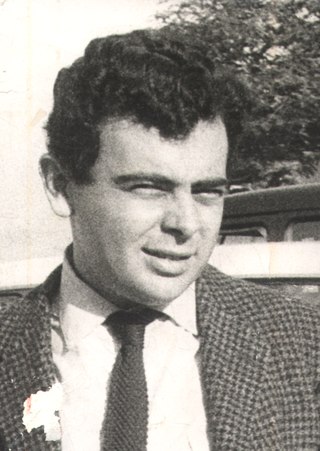
Glauber de Andrade Rocha was a Brazilian film director, actor and screenwriter. He was one of the most influential moviemakers of Brazilian cinema and a key figure of Cinema Novo. His films Black God, White Devil and Entranced Earth are often considered to be two of the greatest achievements in Brazilian cinematic history, being selected by Abraccine as, respectively, the second and fifth best Brazilian films of all-time. Rocha also the distinction of having the most films on Abraccine's list: 5 films.

Mariana Ximenes do Prado Nuzzi is a Brazilian actress. Her first role was in the telenovela Fascinação in 1998 where she portrayed the role of Emília Gouveia. In the same year she played the role of Ruth Stern in the film Caminho dos Sonhos. In 2000, she played in Uga-Uga portraying "Bionda". This role rise to prominence as she became widely known in Brazil and internationally. Later in 2001, she offered her services in the Portuguese voice over translation in the Canadian/Chinese animated series Braceface, for the character Sharon Spitz. She later played the protagonist in Cobras & Lagartos in 2006 and Lara in A Favorita, later in 2008. In 2010, she portrayed her first villainous role in the critically acclaimed telenovela Passione. Since 2010 she has appeared in several telenovelas, television series, films and theatre performances. In 2016, she starred the successor of Totalmente Demais, Haja Coração, together with Malvino Salvador.
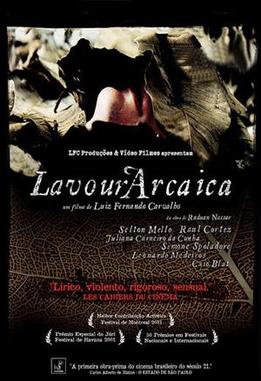
To the Left of the Father is a 2001 Brazilian drama film produced, written, directed and edited by Luiz Fernando Carvalho, based on the novel of the same name by Raduan Nassar. The film follows a man who returns to his father's home after many years and falls in love with his sister. In 2015, the Brazilian Film Critics Association (Abraccine) placed To the Left of the Father among their list of 100 Greatest Brazilian Films of All Time.
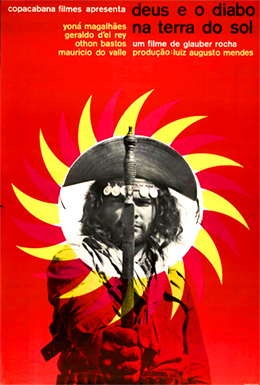
Black God, White Devil is a 1964 Brazilian film directed and written by Glauber Rocha. It was filmed in Monte Santo, Bahia.
The Other Side of The Street or O outro lado da rua is a 2004 Brazilian film written and directed by Marcos Bernstein. It stars Fernanda Montenegro and Raul Cortez.
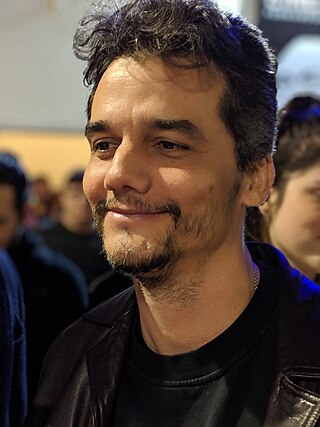
Wagner Maniçoba de Moura is a Brazilian actor, director and filmmaker. Wagner started his career doing theater in Salvador, where he worked with renowned directors, and soon scored some appearances in films. In 2003, he got his first leading roles in movies, in addition to having a prominent role in Carandiru, which propelled him to the main scene of Brazilian cinema. He continued starring in national feature films, including the box office hits Elite Squad and Elite Squad 2, playing the famous character Captain Nascimento. The first film received the Golden Bear award and both productions reverberated outside Brazil, which boosted the actor's international recognition.
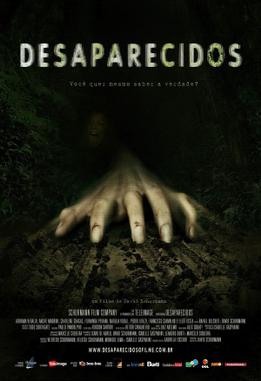
Desaparecidos is a 2011 Brazilian horror film directed by David Schürmann. The film tells the story of a group of six friends, who after going to a party on an island, mysteriously disappeared, with frightening images of them registered by the cameras. Found by the authorities, these images are the only way to find out what happened to them.

Twenty Years Later is a 1984 Brazilian documentary film directed by Eduardo Coutinho.
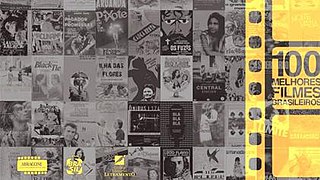
In 2015, the Brazilian Film Critics Association (Abraccine) published a list with the 100 best Brazilian films ever according to the votes of its members. This poll was the basis for a book named The 100 Best Brazilian Films, published in 2016. The idea of the ranking and the book was suggested by publisher Letramento, with whom Abraccine and television network Canal Brasil co-released the book. The ranking was done based on individual lists done by Abraccine's 100 critics, who initially mentioned 379 films. The full list was first made available to the public on 26 November 2015, and the book was released on 1 September 2016.

The Red Light Bandit is a 1968 Brazilian crime film directed by Rogério Sganzerla, inspired by the crimes of the famous real-life robber João Acácio Pereira da Costa, nicknamed the "Red Light Bandit". The film is regarded as a classic work of Cinema Marginal, the Brazilian underground filmmaking movement of the 1960s. Sganzerla was about 22 years old when he directed it.

O Dia do Galo is a 2014 Brazilian documentary film about the 2013 Copa Libertadores Finals. The film follows five supporters of Brazilian football club Atlético Mineiro in the day of the final match of the competition. It was released in Brazilian theatres on 24 July 2015.
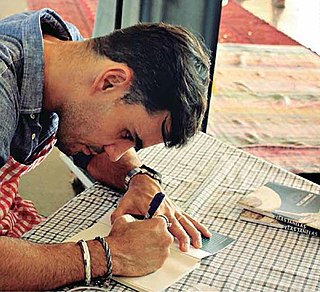
Juliano Cazarré is a Brazilian actor and writer. He appeared in more than thirty films since 2002.
Mar de Rosas is a 1977 Brazilian film directed by Ana Carolina. In November 2015, the film was ranked 81st by the Brazilian Film Critics Association (Abraccine) on its list of the 100 best Brazilian films of all time.
Peões is a 2004 Brazilian documentary film directed by Eduardo Coutinho.

Iracema: Uma Transa Amazônica is a 1974 Brazilian Cinema Novo film directed by Jorge Bodanzky and Orlando Senna and very loosely inspired by Iracema: The Legend of Ceará, an 1865 novel by José de Alencar. The film takes place in the state of Pará. The title can refer to a deal or transaction, to the Trans-Amazonian Highway, but also to sexual intercourse.
Aruanda is a 1960 Brazilian documentary short film by Linduarte Noronha, about the remnants from a former quilombo in the backlands of Paraíba State.
Santiago is a 2007 Brazilian documentary film by João Moreira Salles, about Santiago Badariotti Merlo (1912-1994), a butler who worked for the filmmaker's family for 30 years.
Master: A Building in Copacabana is a 2002 Brazilian documentary film by Eduardo Coutinho, about residents of a building in the Copacabana, Rio de Janeiro.
Di Cavalcanti, or simply Di, is a 1977 Brazilian documentary short film by Glauber Rocha, about the funeral of the internationally renowned painter Di Cavalcanti.

Clara Galiani Tiezzi Dias Vaz is a Brazilian actress. She is known for being the protagonist of the children's series Teca na TV and for her prominent role as Mabi in the telenovela Ti Ti Ti; the latter secured her five awards in six categories, voted winner overall. In 2018, she was cast in the Nickelodeon Latin America series Noobees, the first Tiezzi's international work, whose character was also voiced by her for airing in Brazil.













